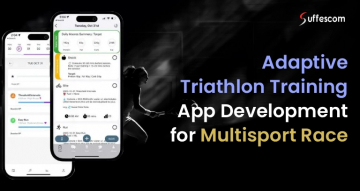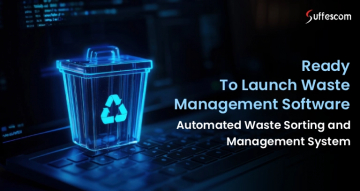A Complete Guide to Blockchain Payroll Management System Development

One of the major challenges businesses all around the world continue to face is managing payroll efficiently.Traditional payroll systems struggle with delays, errors, high costs, and compliance complexities especially for organizations with distributed teams or international operations. This is where crypto payroll systems are emerging as a transformative solution.
Blockchain technology is fundamentally changing payroll management by introducing transparency, automation, and real-time processing capabilities. Crypto payroll solutions enable instant cross-border payments, eliminate intermediaries, and provide immutable audit trails addressing the core limitations of conventional systems.
Finance leaders across industries are increasingly adopting blockchain for payroll operations. According to recent industry reports, companies implementing automated payroll systems achieve up to 131% ROI while reducing processing errors by over 60%. Real-time wage payments via crypto payroll platforms are no longer in the realm of fantasy-they're now becoming operational reality.
The following comprehensive guide covers all aspects of crypto payroll system development: architecture components, strategies of implementation, essential features, and considerations of compliance. Whether assessing blockchain payroll options for your organization or planning to develop a custom solution, this guide provides the technical insight you need.
Why send money in chunks when you could pay in real-time? Blockchain lets payroll flow as naturally as messaging.
So, why are more companies leaning in? Because they want less red tape and more peace of mind. In this blog, we'll examine what goes into blockchain payroll management system development and why it might just be the change we've all been waiting for.
Why Traditional Payroll Systems Are Inadequate for Modern Businesses
Paying your team should be simple, but more often than not, it's anything but. Traditional payroll systems rely on banks, batch processing, and outdated infrastructure. It works, but not very well.
1. Manual Inefficiencies
Traditional payroll systems rely heavily on manual data entry, requiring dedicated personnel to input employee hours, calculate deductions, and generate payslips a time-consuming and error-prone process.
The 2024 Alight Company Payroll Complexity Report reveals significant inefficiencies:
- 51% of payroll departments still use spreadsheets
- 19% rely on paper-based processes, leading to significant time inefficiencies and
- Over 57% of companies in our study have a global payroll strategy that is managed at either a global, regional, or local level.
Crypto payroll solutions address these inefficiencies through smart contract automation, eliminating manual data entry and reducing processing time by up to 90%.
2. High Errors
Manual entries account for nearly 40% of payroll errors, which undermines employee trust and necessitates costly correction cycles. Manual operations pose a significant concern, particularly for companies operating in multiple regions and jurisdictions, as payroll errors can result in penalties.
Companies operating in multiple countries face a 67% chance of fines compared to 24% for single-country operations, highlighting the inadequacy of conventional systems.
Crypto payroll systems eliminate calculation errors through automated smart contracts and provide immutable transaction records that simplify compliance auditing.
3. Compliance Complexities
Traditional payroll management systems have two major compliance issues. First, these are not accommodating to dynamic regulations. The "Future of Payroll Survey" by Thomson Reuters identified compliance challenges as the top pain point for 43% of payroll professionals.
Another challenge is the multi-jurisdictional issues. The 2024 Payroll Complexity Survey, conducted by Dayforce and PayrollOrg, found that 33% of respondents struggled with managing multi-jurisdictional payroll.
4. Lack of Data Actionability and Integration
Data in outdated payroll management systems is highly scattered across inefficient systems or complex spreadsheets. The 2024 Payroll Complexity Survey reported that 74% of payroll professionals face data-related issues. It becomes highly complex to analyze or integrate the payroll software with other HR or financial systems.
5. Inability to Meet Employee Expectations
As the trends are changing, employees increasingly expect faster access to wages, such as earned wage access (EWA). The 2022 Ceridian survey found that 79% of employees want same-day wage payments, a 30% increase from 2018.
The 2024 Paycheck Impact Study by Morning Consult noted that 61% of Americans live paycheck to paycheck, emphasizing the need for flexible payroll systems that conventional setups cannot meet.
Such inabilities can increase employee dissatisfaction with delayed or inflexible payroll processes, leading to higher turnover.
6. Security and Fraud Risks
Conventional payroll systems, particularly those based on paper or Excel, often lack robust security features such as encryption or multi-factor authentication. A decentralized payroll management system ensures secure payroll management operations.
7. High Operational Costs
Manual payroll processes require a team, which increases operational costs; however, this is not the case with blockchain-based payroll systems. The 2024 Alight Company Payroll Complexity Report cited a 131% return on investment for companies switching to integrated payroll systems, highlighting the cost inefficiencies of maintaining conventional systems.
How Blockchain-Powered Payroll Management Systems Address These Inefficiencies
Crypto payroll platforms leverage blockchain's inherent characteristics decentralization, immutability, transparency, and smart contract automation to fundamentally transform payroll operations. Here's how these systems address traditional payroll challenges:
1. Improving Manual Efficiencies
Blockchain-based payroll systems use smart contracts to execute payroll operations, cutting the transaction processing time drastically. Additionally, traditional payroll systems often require multiple intermediaries, which can take several business days for international transfers.
Blockchain enables real-time, borderless transactions, processing payments in seconds. Once the details are set, the smart contract automatically facilitates the transaction.
2. Tackling High Error Rates
Human error is responsible for 95% of cybersecurity breaches, many of which involve payroll mistakes, such as incorrect payments. Blockchain's automation and tamper-proof records significantly reduce these errors.
3. Simplifying Compliance Complexities
Traditional systems struggle to keep pace with the complex and ever-changing tax and labor laws, particularly for companies operating in multiple countries. Blockchain's smart contracts are easy to program, incorporate local regulations, and update automatically to ensure compliance. Smart contracts embed tax rates and labor laws, automatically adjusting for changes.
4. Data Management
Seamless data management and analytics are two major problems with conventional payroll management software. Blockchain solutions aim to solve these challenges by creating a single, shared ledger that connects payroll data with other systems, enabling real-time insights.
5. Fulfill Employee Expectations
Modern employees increasingly demand faster wage access, including earned wage access (EWA) options. Surveys indicate that 79% of employees prefer same-day wage payments, a 30% increase from 2018.
Crypto payroll solutions enable:
- Real-time salary disbursement through cryptocurrency or stablecoin payments
- Transparent, accessible payment histories on blockchain
- Instant cross-border transfers without traditional banking delays
Global technology firms are implementing crypto payroll platforms to facilitate instant payments, improving cash flow management and employee satisfaction scores.
6. Robust Security Measures
Data breaches cost $3.86 million per incident, and 30% involve internal actors. Blockchain's decentralized nature reduces these risks by 60% compared to traditional systems. Blockchain's decentralized, encrypted ledger spreads data across multiple computers, making it nearly impossible to hack or alter.
7. Lesser Operational Costs
Conventional payroll systems incorporate various middle parties, which increases the cost per transaction. Blockchain eliminates these middlemen, allowing for direct payments to employees' digital wallets and reducing costs. Blockchain enables peer-to-peer payments via cryptocurrencies, bypassing bank fees.
Essential Features of a Decentralized Payroll Management System
A robust crypto payroll system incorporates several critical features that distinguish it from traditional solutions:
1. Cryptographic Security
Blockchain employs advanced cryptographic techniques to encrypt payroll data, preventing unauthorized access or alterations. Multi-signature verification and private key management help to ensure that no unauthorized personnel are able to approve any transaction.
2. Smart Contract Automation
Self-executing smart contracts are set to automatically carry out payroll computation, tax deductions, and disbursements for eligible employees based on set conditions, thereby taking minutes compared to days to process.
3. Immutable Audit Trail
Once the transactions are recorded on the blockchain, they are unalterable and cannot be erased, resulting in an immutable and irrevocable audit trail for compliance purposes.
4. Real-Time Payment Processing
Employees are paid immediately through digital wallets, thus facilitating earned wage access, thereby removing the delay previously experienced when using bank transfer cycles.
5. Multi-Currency Support
The crypto payment platforms enable payments through cryptocurrencies, stablecoins and fiat currencies catering to the varying needs of their employees.
6. Full Transparency
All authorized stakeholders can verify payroll transactions on the distributed ledger, reducing fraud potential and building organizational trust.
7. Decentralized Architecture
Unlike centralized systems vulnerable to single points of failure, crypto payroll solutions distribute data across network nodes, ensuring continuous availability and enhanced disaster recovery.
8. System Interoperability
Modern blockchain payroll systems integrate seamlessly with existing HR management systems, accounting software, and ERP platforms through standardized APIs, enabling unified data workflows.
Understanding the Components of a Blockchain-Powered Payroll Management System
Let's break down the different components and understand each one.

1. Blockchain Ledger
A blockchain ledger is like a shared notebook that records every payroll transaction. A ledger is an ecosystem that includes various users, transactions, and applications. It ensures high transparency, trust, and interoperability.
2. Nodes and Network
Instead of a single entity controlling payroll, multiple computers or nodes hold a copy of the ledger. They all agree on each entry before it’s recorded, so it’s extra secure.
3. Smart Contracts
Smart contracts are self-executing protocols that automatically trigger payroll transactions when predetermined conditions are met. In crypto payroll system development, smart contracts handle:
- Salary calculations based on hours worked or performance metrics
- Automatic tax deductions according to jurisdictional requirements
- Benefits allocation and deduction processing
- Milestone-based payments for contract workers
4. Integration with HR/Payroll Systems
HR or payroll systems integration acts as a link between old and new systems. It seamlessly moves data, such as hours worked, tax information, or time-off records, into the blockchain.
5. Payment and Wallet Layer
This is where employees receive their compensation, which can be in the form of stablecoins, cryptocurrency, or fiat currency via a bank. It's the part that makes paying instant and borderless.
6. Compliance and Audit Module
The compliance and audit module functions like a built-in bookkeeper, tracking tax deductions, recording transactions with date and time stamps, and maintaining an entire audit history.
How to Implement Web3 Payroll Systems
A Web3 payroll system utilizes blockchain-based digital assets such as Bitcoin or stablecoins and smart contracts to automate and manage employee compensation. Let's explore the process of implementing Web3 payroll systems.

1. Choose a Blockchain Platform
Select a blockchain network that supports smart contracts, such as Ethereum or Solana. Smart contracts automate payroll tasks, such as salary calculations, tax deductions, and disbursements.
Evaluate transaction speed, fees, and scalability when choosing the blockchain platform. Solana offers low-cost, high-speed transactions, making it suitable for frequent payroll runs.
2. Select a Crypto Payroll Platform
Choose a comprehensive crypto payroll platform development partner or existing solution that supports:
- Multi-currency payments (crypto, stablecoins, fiat)
- Batch payment processing for large workforces
- Integrated tax calculation and reporting tools
- API connectivity for HR/accounting system integration
- Compliance frameworks for multiple jurisdictions
Evaluate platforms based on security certifications, transaction costs, supported blockchain networks, and customer support quality. Consider whether to build custom crypto payroll software or implement white-label solutions.
3. Smart Contracts Development
Engage blockchain developers experienced in crypto payroll software development to create or customize smart contracts that automate:
- Salary distribution based on employment contracts
- Progressive tax withholding calculations
- Benefits contributions and deductions
- Multi-signature approval workflows for large transactions
Conduct thorough smart contract audits by third-party security firms to identify vulnerabilities before deployment. Well-designed contracts reduce administrative overhead by 70-80% compared to manual processing.
4. Integration with Existing Systems
Connect the Web3 payroll system to HR and accounting software using APIs or integration tools. This integration ensures smooth data flow and compatibility with current workflows. Before integration, ensure platform compatibility with tools like QuickBooks or SAP.
5. Setting Employee Wallets
Wallets are integral for crypto transactions; hence, provide employees with secure digital wallets to receive payments and offer guidance on setup. A wallet should have essential security measures, such as two-factor authentication.
6. Ensure Regulatory Compliance
Collaborate with legal and tax experts to meet local and international regulations like AML, KYC, and tax laws. What's the purpose here? To avoid legal penalties and ensure proper tax reporting. It is essential to check the cryptocurrency taxation rules that vary by country.
7. Educate Your Workforce
Creating a blockchain-based payroll management system is one initiative, but ensuring that the workforce adapts easily is another task. Offer training on digital wallets, crypto risks, and asset management. Provide clear documentation and ongoing support to help employees use the system confidently.
8. Monitor and Adapt
Regularly review the system for compliance, security, and efficiency, and adapt to regulatory or technological updates. Effective monitoring keeps the system future-proof in a rapidly evolving landscape. To ensure proper tracking, schedule quarterly audits and updates to maintain accuracy and ensure ongoing accuracy.
Strategic Cost and ROI Framework for Crypto Payroll System Development
Developing a custom crypto payroll solution involves cost considerations spanning infrastructure, automation, compliance engineering, and long-term system evolution.
Blockchain Network and Transaction Fees
The chosen blockchain, transaction volume, and gas price volatility determine costs. High-frequency payroll systems require a low-latency network to deliver more predictable transaction costs.
Smart Contract Engineering and Auditing
Payroll automation relies on secure smart contracts for salary calculation, tax deductions, and approvals. Third-party security audits should be a must to avoid vulnerabilities and financial exploits.
Enterprise System Integration
API and middleware integration with HRMS, ERP, and accounting platforms; complexity increases when interfacing with legacy systems.
Regulatory and Legal Compliance
Compliance with tax, labor, KYC, AML, and reporting requirements across jurisdictions is a significant cost factor: legal and compliance engineering is substantial for crypto payroll platforms.
Employee Onboarding and Enablement
Other costs include secure wallet provisioning, access control setup, and workforce training to ensure ease of adoption and reduce operational errors.
Ongoing Maintenance and Platform Evolution
This includes post-launch expenses such as upgrading smart contracts, implementing security updates, addressing compliance changes, performing blockchain network upgrades, and monitoring systems.
Estimated Investment Range
Typical crypto payroll system development costs range between $50,000 and $200,000, depending on system complexity, feature depth, supported jurisdictions, and security requirements. Most organizations realize return on investment within 12 to 18 months through reduced processing costs, elimination of intermediaries, minimized errors, and operational automation.
Technology Stack for Blockchain Payroll Management System Development
A scalable and secure crypto payroll platform requires a carefully selected technology stack that supports intelligent contract automation, regulatory compliance, system interoperability, and high transaction throughput. The following table outlines a recommended tech stack across core system layers.
| Layer | Technology Options | Purpose |
| Blockchain Protocol | Ethereum, Polygon, Solana, Avalanche | Smart contract execution, decentralized ledger management, transaction validation |
| Smart Contract Language | Solidity, Rust | Encoding payroll logic, tax rules, payment triggers, approval workflows |
| Backend Framework | Node.js, NestJS, Spring Boot | Payroll orchestration, API handling, business logic processing |
| Frontend Framework | React.js, Next.js, Angular | Admin dashboards, employee portals, payroll visualization |
| Wallet Infrastructure | MetaMask, WalletConnect, Fireblocks, Coinbase Wallet SDK | Secure salary disbursement, employee wallet integration |
| Treasury & Liquidity Management | Stablecoin Vaults, Custodial Wallets | Fund allocation, liquidity control, salary pool management |
| Database Layer | PostgreSQL, MongoDB | Off-chain payroll metadata, employee records, reporting data |
| Payment Assets | Stablecoins (USDC, USDT), Native Tokens | Price-stable salary payments, cross-border settlements |
| Security Layer | Multi-signature wallets, HSMs, Encryption Protocols | Transaction authorization, key management, data protection |
| Identity & Access Management | Role-Based Access Control, MFA | Admin control, permission management, access security |
| Compliance Tooling | KYC APIs, AML Monitoring Engines | Identity verification, regulatory adherence |
| Oracle Services | Chainlink, Custom Oracles | Exchange rates, tax parameters, external data feeds |
| Integration Layer | REST APIs, Webhooks | HRMS, ERP, accounting system interoperability |
| Infrastructure & Hosting | AWS, Google Cloud, Azure | Scalability, uptime, disaster recovery |
| DevOps & CI/CD | Docker, Kubernetes, CI Pipelines | Automated deployment, version control, system reliability |
| Monitoring & Analytics | Grafana, Prometheus, ELK Stack | System health monitoring, payroll analytics |
| Audit & Testing | Third-party Smart Contract Auditors | Vulnerability detection, protocol validation |
Advanced Security Controls Powering Secure Crypto Payroll Systems
Security is foundational to any blockchain-based payroll architecture. Given the financial sensitivity of payroll operations, crypto payroll systems must be designed with defense-in-depth security principles to safeguard assets, employee data, and transactional integrity.
Core Security Controls
Multi-Signature Authorization Framework
High-value employee payments must use multi-signature authorizations to prevent a single organization from processing them.
Smart Contract Security Audits
All payroll smart contracts must undergo regular audits by reputable blockchain security firms to identify any faulty logic or attack vectors, such as reentrancy, prior to deployment.
Cold Storage for Treasury Reserves
The reserves and working capital must be secured using cold storage wallets to protect the assets from cyber threats.
KYC & AML Enforcement
Know Strong identity verification systems and transaction monitoring tools are vital to ensure compliance and the absence of fraudulent practices, even more so within the context of cross-border payroll services.
End to End Data Encryption
Sensitive employee information such as identifiers and payment records should be protected using encryption both in rest and in transit with enterprise-level cryptography.
Disaster Recovery and Backup Protocols
Redundant backups, node replication, and failover mechanisms ensure business continuity and rapid recovery in the event of network outages or system failures.
Wrapping Up!
While payroll is a basic business function, it can be as complex as launching a new product. Payroll efficiency is a crucial element in ensuring optimal workforce performance. Hence, establishing a crypto payroll software with tax compliance is highly vital.
Evidently, blockchain-based payroll systems are way better than the traditional ones. These advanced payroll systems reduce manual inefficiencies, avoid payroll errors, and streamline compliance complexities.
The best results arrive only if you have a payroll system that beats the competition and is equipped with basic and advanced features. Get assistance from Suffescom Solutions on blockchain payroll management system development.
FAQs
1. What is a blockchain payroll management system?
It is a decentralized version of a digital payroll management system. These systems run on a blockchain network that implements decentralization, interoperability, and security.
2. What is the biggest impact blockchain could have on payroll?
Blockchain's most highlighted impact on payroll is improvement in security, accuracy, transparency, interoperability, workforce satisfaction, and cost savings.
3. What are the features of the decentralized payroll management system?
A decentralized payroll system includes transparency, security, smart contract automation, immutability, decentralization, real-time payments, and data interoperability.
4. How to implement Web3 payroll systems?
The process of implementing Web3 payroll systems begins with selecting a blockchain platform, followed by choosing a Web3 payroll platform, developing smart contracts, integrating systems, setting up employee wallets, ensuring regulatory compliance, educating the workforce, and concluding with ongoing monitoring and maintenance.
5. How is decentralized software revolutionizing global payroll with blockchain?
Blockchain payroll software brings instant, secure, transparent, automated, and cost-effective payroll worldwide. By removing complexity, it turns payroll into a streamlined, trust-filled experience.







